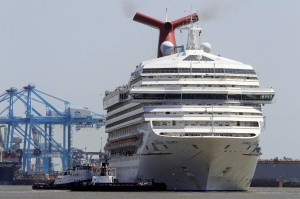Royal Caribbean joined the list of seafaring companies taking heat for public disaster. The company was forced to cut a trip short when a fire broke out on its ship, Grandeur of the Seas.
The incident places Royal Caribbean in the same boat with Carnival Cruise Lines, which also suffered an engine fire earlier this year. The fires are only two of many problems happening industry-wide.
Professionals in the industry, however, say the incidents are isolated and should not deter vacationers from booking a cruise.
Vance Gulliksen, director of public affairs at Carnival Cruise Lines, attested to the safety of the company’s passengers.
“Considering Carnival Cruise Lines operates 1,500 voyages a year and carries 4.5 million passengers annually, these types of instances are quite rare,” Gulliksen said.

The Cruise Line International Association reported 26 major North American cruise lines transported 16 million passengers in 2012. Given a ship’s average capacity, that equates more than 7,000 voyages. However, data to compare the voyage total against the number of safety incidents such as the Royal Caribbean fire is difficult to come by.
Dr. Ross Klein, a professor at the Memorial University of Newfoundland in Canada, researches the industry and operates the website cruisejunkie.com. He explained the difficulty.
“The cruise industry tends to avoid reporting incidents or accidents,” Klein said. “We often rely on passenger accounts.”
Using passenger accounts and media coverage, some private organizations compile lists of events at sea. For example, shipdetective.com listed eight major incidents at sea in 2012 and two so far this year.
Though data on all safety incidents is not readily available, the industry is required by U.S. law to report major crime on cruise ships involving U.S. nationals or taking place in U.S. waters. Online data provided by the U.S. Coast Guard reported 10 cases of major crime on cruise ships in 2012.
The report, issued quarterly, classifies major crime as homicide, suspicious death, a missing U.S. national, kidnapping, assault with serious bodily injury, tampering with the vessel, theft in excess of $10,000 or sexual assault. It does not count cases still under investigation by the FBI.
Rear Admiral Wayne Justice of the Coast Guard testified before a congressional committee regarding passenger security.
“There is no data to suggest that crime on cruise ships is more prevalent or severe than in any other vacation venue,” his testimony reads. “Prospective cruise ship passengers need to assess the level of security and safety on cruise ships on which they may embark just like they would evaluate their safety and security risks when visiting a foreign country.”
Given the relatively small number of problems, issues in the media don’t discourage people like senior Bryan Tagge of Bountiful. He and his family recently returned from a voyage in the Caribbean.
“We understood that it’s really rare for cruise ships to have those kinds of problems,” Tagge said. “We weren’t hesitant at all. Not once did I worry about anything.”




